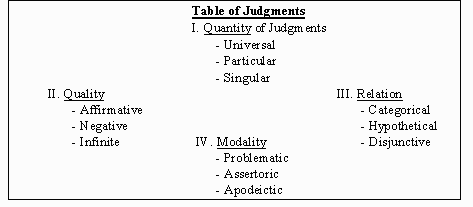- Without sensibility we cannot have intuition. Therefore, understanding cannot be a faculty of intuition.
- Function: the unity of the act of bringing various representations under one common representation.
- Concepts rest on functions.
- No concept is related to an object immediately, but only to some other representation of it.
- Judgment: the mediate knowledge of an object, i.e. the representation of a representation of it.
- We can reduce all acts of the understanding to judgments.
- If we abstract all content from a judgment, the function of thought in judgment is the Table of Judgments.

- Observations:
- In syllogisms, a singular judgment can be treated like the universal, but in respect to quantity it stands as unity to infinity and is therefore essentially different.
- Similarly, infinite judgments must be distinguished from affirmative.
- All relations of thought in judgments are:
- of the predicate to the subject (we consider two concepts).
- of the ground to its consequences (we consider two judgments).
- of the divided knowledge and of the members of the division, taken together, to each other (we consider several judgments in their relation to each other).
- Modality of judgments contributes nothing to the concept of judgments but only concerns the value of the copula in relation to thought in general.
- Problematic: affirmation or negation is taken as merely possible.
- Assertoric: affirmation or negation is taken as true (real).
- Apodeictic: affirmation or negation is taken as necessary.
- Synthesis: the act of putting different representations together, and of grasping what is manifold in them in one act of knowledge.
- Considered pure if the manifold is not empirical.
- Synthesis is what first gives rise to knowledge, i.e. it is not analysis.
- It is an act of the imagination.
- Pure synthesis gives us pure concepts of the understanding.
- The Categories have derivative concepts called predicables.
- i.e. under causality go force, action, passion.

- Observations:
- The four classes could instead be divided into two groups:
- Mathematical: concerned with objects of intuition either pure or empirical.
- Dynamical: concerned with existence of objects in their relation to each other or to the understanding.
- Third category in each class arises from the combination of the first two.
- The four classes could instead be divided into two groups:
Forward to Chapter 2: The Deduction Of The Pure Concepts Of The Understanding.